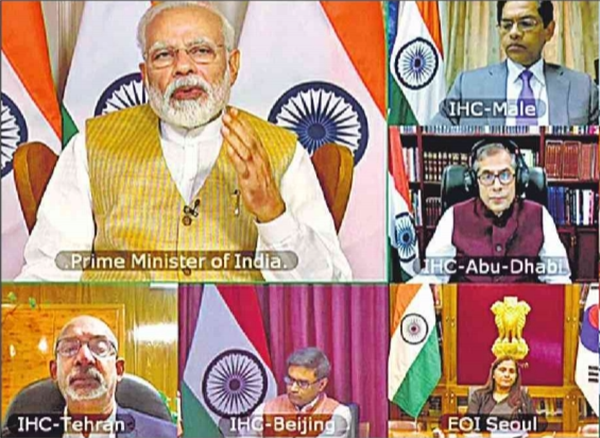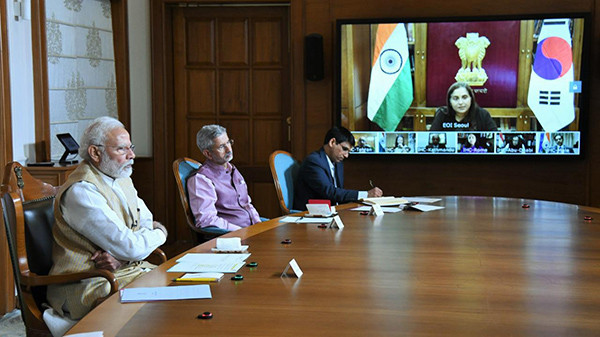Says Prime Minister Modi of India at video conference
The following article was contributed to The Korea Post media by the Embassy of India in Seoul for publication on the occasion of continuous spread of CORONA virus around the world. —Ed.
Prime Minister Shri Narendra Modi held a video conference with the Heads of all of India’s Embassies and High Commissions worldwide at 2030 hrs, 30th April 2020. This conference—the first such event for Indian Missions worldwide—was convened to discuss responses to the global COVID-19 pandemic.
Prime Minister noted that extraordinary times require extraordinary solutions, which was why even in this globalized era, most of the world had quarantined itself. This was an unavoidable step taken to fight this pandemic, but it was also hugely consequential, as the closure of the globalized system has had an extensive and far-reaching impact upon the international transport system, financial markets and the global economy.

Prime Minister said that India had taken unprecedented and early steps in response to this pandemic from mid-January this year, to reduce the risk of importing the infection, and thereafter to prevent a large outbreak. This included the world’s largest quarantine and lock-down, implemented by India.
The Prime Minister complimented Heads of Missions for their efforts to evacuate Indians stranded abroad in some of the epicentres of the crisis. He also exhorted them to take steps on five specific counts:
I. To ensure their own health and safety, and that of their teams and families;
ii. To attend to Indians who remain in various foreign countries, given the uncertainty of continuing international travel restrictions. He called on Heads of Indian Missions to help boost the morale of such compatriots abroad, and to help them address issues arising from their unplanned stay abroad, with their host Governments, and also to address other problems Indians might face abroad, including arranging shelter, where necessary and feasible;
iii. To stay alert and identify in their countries of accreditation best practices, innovations, scientific breakthroughs and sources to procure medical equipment, for India’s fight against COVID-19. He also advised Heads of Mission to suitably publicize the newly-established PM-CARES Fund to mobilize donations from abroad;
iv. Since this crisis also impacts upon the economy, PM advised Heads of Mission to also focus on ensuring that commerce in essential supplies, logistics chains, remittances and so on are unaffected, through their coordination with foreign partners;
v. To continue to pay close attention to the evolving international political and economic situation, especially in the context of the COVID-19 pandemic.
In response, ten Heads of Mission, in Beijing, Washington DC, Tehran, Rome, Berlin, Kathmandu, Abu Dhabi, Kabul, Male, and Seoul offered their perspectives to PM and the rest of the audience. They shared feedback regarding appreciation in their countries of accreditation of the resolute measures taken by India to combat this pandemic.

Ambassador of India to ROK, Ms. Sripriya Ranganathan highlighted the very effective measures taken by ROK Government which had prevented a full fledged Community spread through its Trace, Test and Treat strategy whereby it proactively traced people suspected of infection, tested and then treated or isolated them. She mentioned the setting up of drive through and walk through testing facilities across the country, and the use of credit card transaction history, CCTV footage and mobile phone data for tracing the movements of confirmed patients. She stressed the use of mobile apps for tracking self quarantine that allows the health authorities to monitor symptoms and movement. Ambassador highlighted that the Korean Government had not opted for a lock down strategy but that schools and universities have been closed and people areencouraged to work from home. Ambassador said that the Embassy has been in constant touch with the Indian community associations to ensure that support is extended to those in need.
Ambassador Ranganathan suggested that we could assess if ROK’s testing and tracing protocols and procedures and contact tracing would work in India. She also said that we are exploring sourcing of Covid test kits, ventilators and protective gear from Korean companies. She added that it would be important to enable quick resumption of normal access for Korean business travellers as soon as the situation improves.
Other Heads of Mission outlined their efforts to help Indians stranded abroad, in particular, students and workers. They also reported on efforts to identify medicine, medical devices, technologies, research and other measures which might help in India’s own national effort to fight this pandemic. They reported on lessons learned in other countries, and best practices that could be adopted, in the global fight against COVID-19. In our neighbourhood, Heads of Mission underlined measures to assist the national responses of those countries, using the special fund created at India’s initiative for SAARC countries to combat COVID-19.

